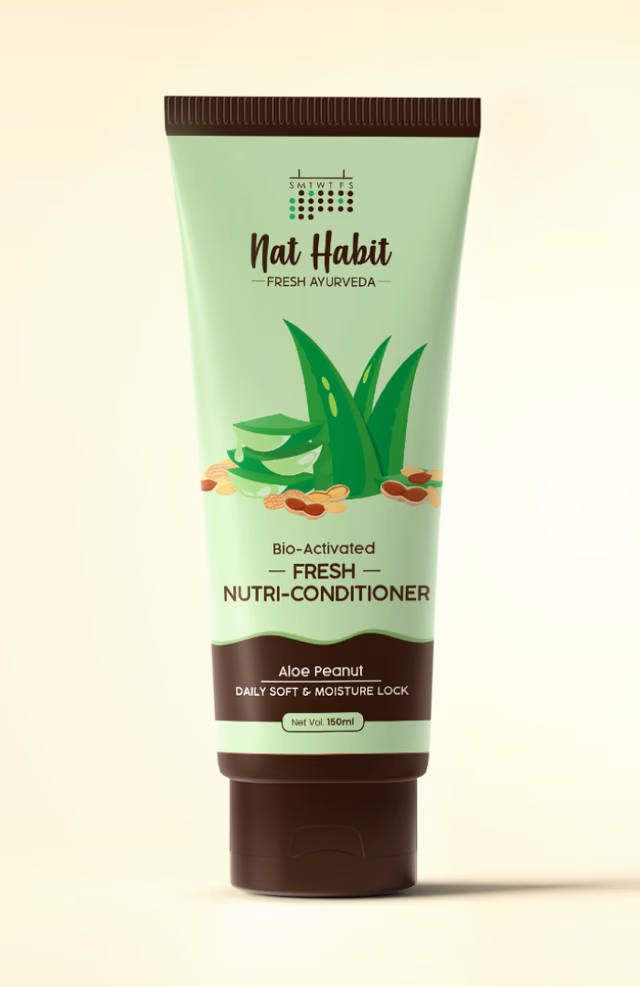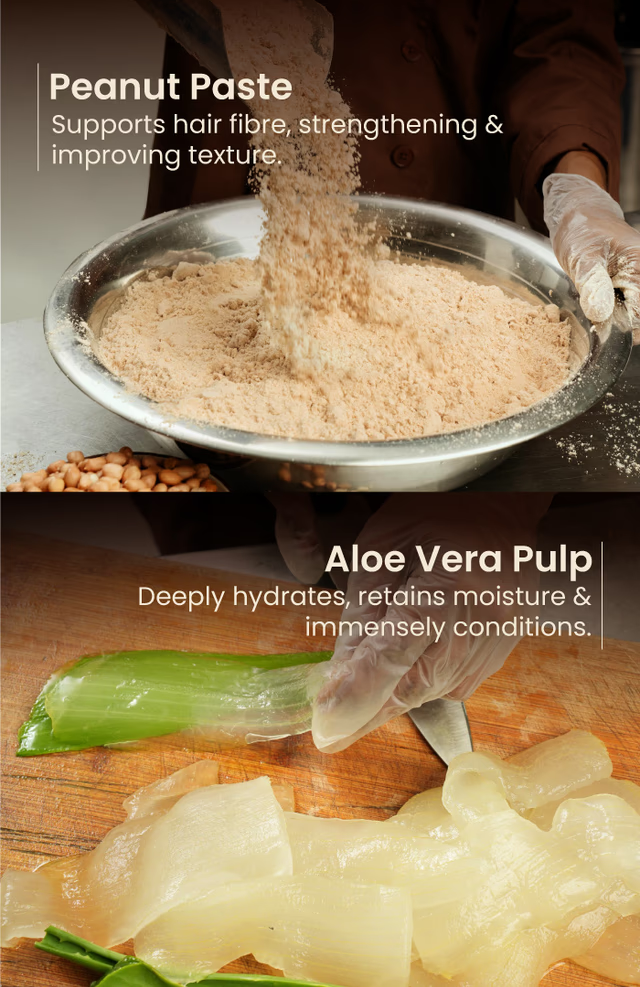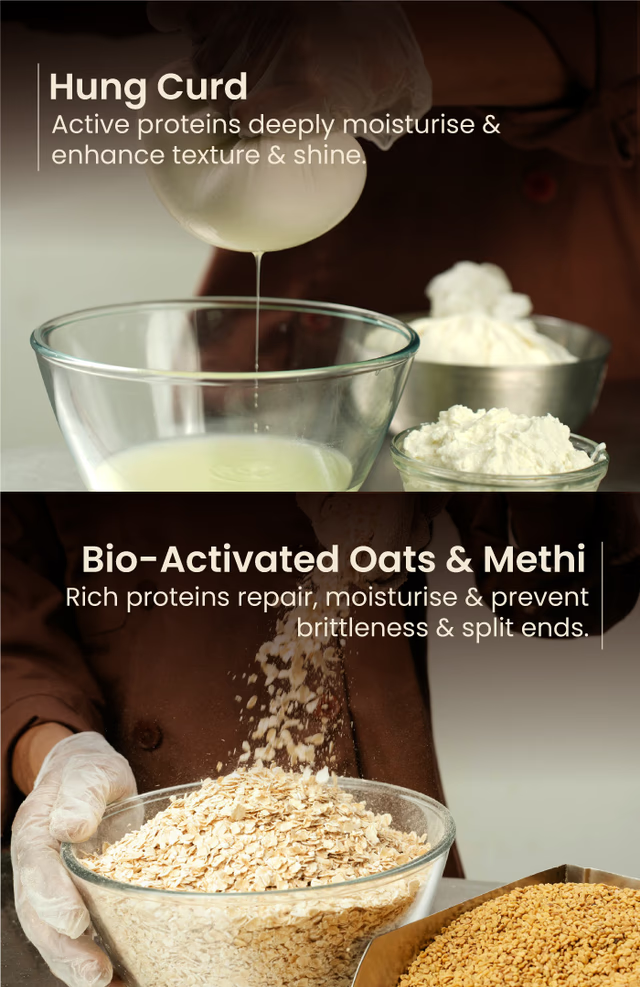Aloe Peanut Nutri-Conditioner
Original price was: ₹385.0.₹275.0Current price is: ₹275.0.
Usage
- Description
- Additional information
- Reviews (0)
- Q & A
- Sustainability Remark
- More Offers
- Store Policies
- Inquiries
Power of 9 Bio-Activated Conditioners
Why you’ll love it
Only Natural Care
✓ Longer Moisture Lock with Power Conditioners
✓ Continuous Damage Repair
✓ Superior Frizz Control
✓ Ultra Shine & Softness
✓ 100% Naturally Derived
✓ NO Silicones, NO SLS/SLES, NO Chemicals
Active Ingredients & Conditioners
Fresh & whole picks
Hung Curd
Rich in protein, deeply moisturises, improves texture, renders shine and enhances softness.
Bio-Activated Methi
Loaded with biotin & riboflavin, locks in moisture, repairs the shaft and enhances moisture absorption.
Bio-Activated Oats
High beta-glucans, phenolic and protein compounds, prevent split ends, promote elasticity and reduce brittleness.
Shea Butter
Loaded with fatty acids, enhances, restores and retains moisture, taming frizz and flyaways, improving elasticity and texture.
Peanut Flour
Builds up hair fibre, strengthening, improving texture and preventing breakage.
Castor Oil
High fatty acids & vit-E, deeply moisturises, enhances shine and prevents sun damage.
Coconut Oil
High fatty acids, reduces protein loss, breakage and damage.
Rich and deep penetrating hydration with immense conditioning increases softness and manageability.
Loaded with polysaccharides, eases detangling, deeply conditions and seals in moisture.
| Weight | 0.15 kg |
|---|
You must be logged in to post a review.
Q & A
Sustainability of Aloe Peanut Nutri-Conditioner
Sustainability Factors:- Natural Ingredients:
- Aloe Vera: Aloe Vera is a sustainable crop because it requires minimal water and can thrive in arid conditions, reducing the need for irrigation and water resources.
- Peanut Oil: Peanuts are legumes that fix nitrogen in the soil, which reduces the need for synthetic fertilizers. This process improves soil health and minimizes the environmental impact.
- Biodegradability:
- The ingredients in Aloe Peanut Nutri-Conditioner are biodegradable, meaning they break down naturally in the environment without leaving harmful residues.
- Minimal Use of Synthetic Chemicals:
- Avoiding synthetic chemicals in the formulation reduces the pollution and environmental damage caused by the production and disposal of these substances.
- Ethical Sourcing:
- If the ingredients are sourced ethically, it means fair labor practices and sustainable farming practices are followed, contributing to overall sustainability.
- Packaging:
- Sustainable packaging options, such as recycled or biodegradable materials, help reduce waste and the carbon footprint associated with the product's lifecycle.
Low Carbon Footprint of Aloe Peanut Nutri-Conditioner
Scientific Justifications:- Energy-Efficient Farming:
- Aloe Vera: Grows in arid regions with minimal water and fertilizer requirements, which translates to lower energy consumption in cultivation.
- Peanut Farming: Peanuts enhance soil nitrogen, reducing the need for energy-intensive synthetic fertilizers.
- Local Sourcing and Production:
- If ingredients are sourced locally, transportation emissions are minimized. Local production further reduces the carbon footprint associated with shipping and logistics.
- Processing Efficiency:
- The extraction and processing of aloe and peanut oil are relatively low-energy processes compared to the synthesis of artificial chemicals.
- Reduced Chemical Use:
- Natural ingredients typically require less processing and energy compared to synthetic alternatives, which involve energy-intensive chemical reactions.
- Renewable Energy in Manufacturing:
- If the manufacturing facilities use renewable energy sources, the carbon footprint of the product can be significantly reduced.
- Aloe Vera Cultivation:
- Research shows that Aloe Vera is drought-resistant and requires less water compared to other crops, making it environmentally sustainable (López et al., 2013).
- Peanut Farming:
- Peanuts have a symbiotic relationship with nitrogen-fixing bacteria, improving soil fertility and reducing the need for chemical fertilizers (Bell et al., 2020).
- Biodegradability:
- Studies indicate that natural ingredients like aloe and peanut oil degrade more easily and completely than synthetic compounds, reducing their environmental impact (Kim et al., 2015).
- Packaging:
- The environmental impact of packaging materials can be mitigated by using recycled or biodegradable options, which reduces waste and energy consumption in production (Hopewell et al., 2009).
References
- López, A., de Tangil, M. S., Vega-Orellana, O., Ramírez, A. S., & Rico, M. (2013). Phenolic constituents, antioxidant and preliminary anti-inflammatory activities of 20 selected Aloe species. Antioxidants, 2(4), 291-310.
- Bell, R. W., Schoknecht, N. R., & Brennan, R. F. (2020). Nitrogen fixation and mineral nutrition of peanut. Field Crops Research, 255, 107922.
- Kim, H. K., Kim, J. H., Byun, S. J., & Jang, Y. S. (2015). Biodegradation of natural and synthetic plastics by microorganisms. Journal of Life Science, 25(3), 282-288.
General Inquiries
There are no inquiries yet.



















Reviews
There are no reviews yet.